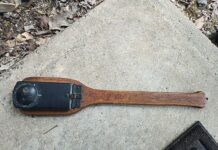“The reward for work well done is the opportunity to do more.” — Jonas Salk
With friends gathered around a little camp fire, one conversation sparked a response from every one of us. We all feel lucky to have been born into the era of our arrival. Having the freedom and spunk to ride a bike or a pony to wherever the boundaries allowed us to roam is what sparked this conversation.
Youthful adventures
My hubby, his brothers and cousins loved to wander the back fields of the farms from a young age, each carrying a gun to shoot the pests wrecking the crops.
“We might be gone all day, but nobody had to worry about us,” Doug said.
My friend, Cindy, rode her pony, Frisco Pete, wherever adventure called. She once went in search of a big downed tree to jump, after the movie National Velvet came along and whispered in her ear that not only could she do it, she simply had to do it.
“Somehow, Grandpa found out and that little rodeo kinda got me in trouble,” Cindy tells with a laugh.
All these years later, we have come to realize just how fortunate we were. No one we knew felt frightened to let children out of their sight in the 1960s, and we made the most of every summer day, the feeling of total freedom indescribable in today’s world.
Polio vaccine
One of the gravest fears of our parents’ generation throughout the world had just been historically addressed with the introduction of a polio vaccine. The weight of worry had been lifted.
From Wikipedia: “The 1952 U.S. epidemic was the worst outbreak in the nation’s history. Of nearly 58,000 cases reported that year, 3,145 people died and 21,269 were left with mild to disabling paralysis, with most of its victims being children.
The “public reaction was to a plague”, said historian Bill O’Neal. “Citizens of urban areas were to be terrified every summer when this frightful visitor returned.” According to a 2009 PBS documentary, “Apart from the atomic bomb, America’s greatest fear was polio.”
Miracle vaccine
I had to have been quite small, and yet my memory of one particular day remains with me. Dad gathered his four daughters in the kitchen (after we had changed in to our “good clothes” and black patent leather shoes) and told us how lucky we were to be going to the school for a new vaccine.
I recall the solemn yet celebratory tone in his voice, saying this was a miracle that had long been sought. He planted the seed of respectful gratitude that he wanted us to carry with us in to the gymnasium that day.
The gym was filled with people, and we waited in line for a tiny cup that we were instructed to drink quickly and completely. We then got in our car and headed back home. This had to have been in the early 1960s, because Albert Sabin had developed an oral polio vaccine in 1961, after Jonas Salk had introduced the inactivated polio vaccine in 1955.
I was born in 1959, so even though I had to have been quite young, somehow that memory remains. Another friend, Candy, remembers each class being called to the gymnasium to receive their polio vaccine.
She also recalls riding her bike quite a harrowing distance to see a classmate, Diane, a happy soul who was in an iron lung. Her long hair cascading, with a slightly tilted mirror Diane looked into while conversing with visitors, are all memories Candy carries.
We both realize, the passing years giving us such wisdom, that our parents had to have lived in tremendous fear before the vaccine was developed and made available.
Years later, while in high school, Mrs. Olive Murray was our English teacher and librarian, and I often volunteered under her direction. She was sometimes stern, and forever it is this lady who comes to mind when picturing an authoritarian figure.
One day while preparing a new science book on medical advances for the Dewey Decimal System of our school library, she confided her own personal heartache. She had a son and a daughter, both brilliant, who had battled polio while on the brink of young adulthood.
A vaccine was being developed, but it did not come in time. The post-polio challenges for her children continued, and though she revealed little, it became clear to me the true miracle brought to the world by research scientists.
“So, don’t you dare ever let simple obstacles hold you back,” Mrs. Murray said. “And stand up straight. Be grateful that you can. Be proud of who you are and accomplish every single thing you set out to do.”
I was stunned
Polio, in my small mind, was all behind us. It was the first time a person with firsthand knowledge had discussed it. I will never forget it.
Remarkable life. Recently, I read the remarkable life story of Mrs. Murray’s daughter in a tribute to her passing. What a grand, full life she lived! Mrs. Murray’s son, Joe, is a practicing attorney in our county, admired and respected.
Neither let polio hold them back. Every single day, we find reasons to grumble, even when there are thousands of reasons to be grateful and humble. Count a few of those today, and make it a great one.












